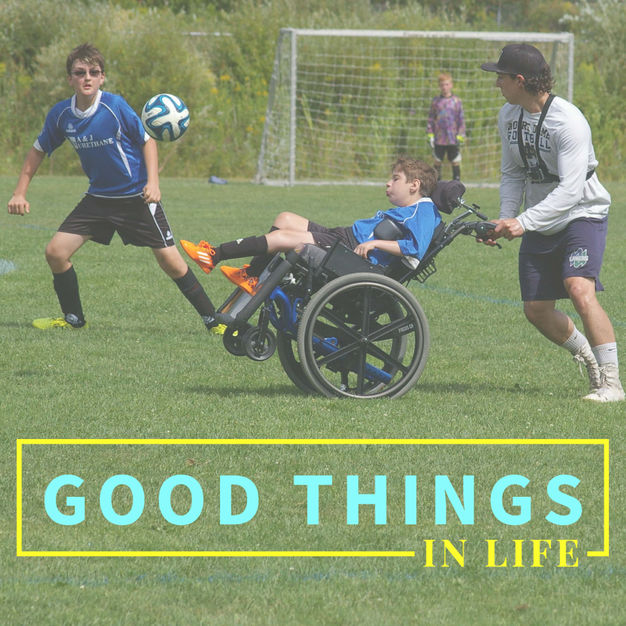
Good Things in Life podcast
Genia Stephen
Join Genia in discussion with other parents, thought leaders and visionaries about helping young children with intellectual disabilities get the good things in life. Want your child to go to school, make friends, play on teams and have a bright future? Join the conversation. Good things in life is for families with vision about what is possible and how to achieve it. Whether your child has cerebral palsy, down syndrome, angelman syndrome, autism or a mild learning disability, Good Things in Life podcast can help you figure out how to take action to protect your child from harm and work towards a good life.
- 1 hour 4 minutesReacting to behaviour: To connect or protect? - Amy Chavez
This week on the podcast my guest, Amy Chavez, and I have a fascinating conversation about our central nervous system and how it relates to difficult behaviour.
Amy explains that our nervous system seeks to do only two things. Connect or protect. That’s it. End of story. No other options.
Which begs the question, do we want people with disabilities to connect with us or feel they need to protect themselves from us.
Which then leads us to examine how we try to support people who are labelled as having difficult behaviours to stop behaving in distressing ways and how we respond when a situation arises.
This episode is a must listen if you have ever encountered someone whose behaviour is difficult to cope with or if you have ever reacted in a way that didn’t feel good. I’m definitely in that camp. Are you?
10 July 2022, 12:33 am - 58 minutes 19 secondsThe Values of Inclusion require a stretch! With Heather Simmons
Heather’s Values Of Inclusion are a pattern interrupt that challenge us to stretch and deepen our understanding of what inclusion really means and what it calls on each of us to believe and live out if we want inclusion to exist in our communities.
If you aren’t sure you buy into inclusion for all people then this episode will be thought provoking. If you are sure you do buy into inclusion for all people then this episode will help you reflect and maybe even identify where you need to stretch.
Get to the full shownotes here.
4 July 2022, 7:38 pm - 1 hour 5 minutesUnderstanding trauma and behaviour with Sarah Buffie
This week on the podcast, Sarah Buffie helps me better understand difficult behaviour.
Our conversation covers trauma, what happens in our bodies when we are triggered by someone else’s behaviour and what we can do about it.
It is a fascinating conversation and one I hope to continue as I deepen my ability to be with people who are struggling and expressing themselves through behaviour that I find difficult to cope with.
20 June 2022, 12:27 pm - 1 hour 15 minutesThe challenge of behaviour isn’t the behaviour with Yeiter
My new friend, Yeiter, wrote a book call Lessons In Listening and it challenges the popular behaviour modification approaches to supporting people with behaviours that are labelled as difficult.
In addition to his listening skills, ability to empathize and connect with others who are often villainized and ostracized, Yeiter is a lovely storyteller.
In this episode of the podcast, Yeiter tells the story of Michelle. Yeiter’s first job was to put Michelle in an isolation room - until he figured out that connecting with her worked better than forcing her into seclusion.
Yeiter goes on to tell other stories of connection and support that are troubling, heartwarming and deep lessons for all of us on the power of listening deeply.
You can read the full show notes here and download a free copy of Yeiter's book, Lessons In Listening, here courtesy of Yeiter and Inclusion Press.
15 June 2022, 6:51 pm - 50 minutes 13 secondsJourney Out of Silence with Christine Robinson
Christine Robinson, wife of late author William (Bill) Rush, joins me to talk about Bill’s book, Journey Out Of Silence.
Journey Out Of Silence is an autobiography chronicling Bill’s early life in therapy based segregated programming to his graduation from the University of Nebraska.
Bill, an articulate journalist with cerebral palsy who used a speech generating device, talks about his parents’ efforts and failures, his experience of segregated education, his pursuit of normal intimate relationships and the liberation he experienced when people treated the environment around him as the problem instead of his disability as the problem.
Christine helps bring Bill’s voice to life in this interview.
You won’t want to miss it.
7 June 2022, 7:27 am - 40 minutes 42 secondsDemystifying Disability with Emily Ladau
Have you ever had a moment when you just weren’t sure what to say or do in relation to someone who has a disability? Perhaps you were nervous that you would say or do the wrong thing and offend someone?
There are lots of good people out there - you are probably one of them - who want to address ableism in themselves but are frankly too nervous to put themselves out there are risk messing up.
This week on the podcast I interviewed Emily Ladau. Emily is the author of Demystifying Disability.
Emily says, “the goal of demystifying disability was not to be the definitive encyclopedia or Bible on disability. It wasn't to speak for every single disabled person. It wasn't to say that I am the authority and the expert on disability because I'm none of those things, right?
I'm only one person, but it was just my way of offering an overture, offering a way to bridge the gap for so many people who maybe don't know how to talk about disability, the language to use, maybe don't know about some of the history. Maybe they're not sure about media representation or etiquette. And I wanted to say, Hey, here's a safe place to start.”
Emily’s book might just be what you are looking for. If you don’t need a primer on disability, I’m sure you know someone who does.
Not sure? Listen to the episode here.
30 May 2022, 10:17 am - 1 hour 14 minutesCreating the futures you want with Jack Pearpoint and Lynda Kahn from Inclusion Press
Han Shan, that great and crazy, wonder-filled Chinese poet of a thousand years ago, said:
We're just like bugs in a bowl. All day going around never leaving their bowl.
I say, That's right! Every day climbing up
the steep sides, sliding back.
Over and over again. Around and around.
Up and back down.
Sit in the bottom of the bowl, head in your hands,
cry, moan, feel sorry for yourself.
Or. Look around. See your fellow bugs.
Walk around.
Say, Hey, how you doin'?
Say, Nice Bowl!
~ David Budbill
This week’s podcast is a conversation with Jack Pearpoint and Lynda Kahn. We talk about Inclusion Press, MAPS and PATH planning tools, storytelling and the importance of coming together.
I struggled to write this because I can’t do justice to the quality of Lynda and Jack’s contributions to this episode.
I just hope you listen and ask yourself what kind of bug in a bowl you choose to be today.
23 May 2022, 1:53 am - 40 minutes 37 secondsInclusiveology much needed in our schools with DJ Nicholson
DJ Nicholson runs Inclusiveology - a 12 week program helping schools plan for inclusion.
This week’s podcast episode we hear a little about what kind of planning is important to support the success of inclusion. And, we hear about how terribly far we are from inclusion in some areas. DJ works in Florida and I’m thanking my lucky stars I’m not parenting my son in that school system!
Let me know what it is like in your school system and what questions you think parents can ask that will help improve inclusion in our schools.
17 February 2022, 10:34 am - 58 minutes 44 secondsAsset-Based Community Development - building solid communities from the strengths within - Darryl Answer, Stephanie Answer, and April Doner
“People coming together to celebrate what they have and what they can do - together.” ~Darryl Answer on what is asset based community development.
So often when we have a need, a service or institution is available with a “fix-it solution.” The solution is determined by the service and we can fit in - or not. Take it or leave it.
Asset-based Community Development (ABCD) is different. ABCD starts with the strengths and contributions of community members.
This week on the podcast Darryl Answer, Stephanie Answer, and April Doner talk about ABCD in their lives and the lives of people with disabilities.
“There is nobody that we don’t need.
The greatest need is to be needed.”
This episode includes vulnerability, strength, power and promise.
You don’t want to miss it.
13 December 2021, 5:00 am - 37 minutes 18 secondsEven Warrior Angels get tired with Susan Dunnigan
Susan Dunnigan is back on the podcast to talk about her book Warrior Angel - the story of her family’s journey with her son Matt.
The first time we chatted we talked about Matt’s educational experiences. This time we talk about the trials and tribulations of adulthood.
Susan describes the energy required by advocacy as waves. Sometimes you are carried forward and sometimes you are left with nothing.
Yet, the need to advocate doesn’t ebb and flow like a wave. Or at least, one’s energy levels don’t necessarily match the need.
In this episode, Susan talks about taking risks and not over protecting her son - even if it means he is at risk of run-ins with the police and being taken advantage of by criminals.
Join us for the reflections and the important reckoning we all need to do when it comes to the dignity of risk.
7 December 2021, 1:03 am - 56 minutes 7 secondsBe brave, find your people, create new spaces with Beth Mount, Hanns Meissner and Pamela Mansell
Cussing alert in this episode.
Nobody lasts long in this world of supporting people with disabilities without finding themselves in a WTF? situation.
There are few or no options.
The only existing options are segregated.
The expectations are abysmally low.
Even good people are unsure how to move forward.
If I’m wrong, and you’ve never been frustrated with a reality like this then reply to this email and tell me.
But I’m guessing that you can relate in some capacity.
Because this is such a common reality, people like the guests on today’s podcast have developed learning institutes, learning journeys, and person centred planning approaches to explore blue space - new space where creative possibilities can be created.
This week on the podcast, Beth Mount, Hanns Meisner and Pamela Mansell discuss what it takes to create new spaces when what exists just won’t do. It takes bravery, finding your people and being willing to journey together.
1 December 2021, 5:37 am - More Episodes? Get the App
Your feedback is valuable to us. Should you encounter any bugs, glitches, lack of functionality or other problems, please email us on [email protected] or join Moon.FM Telegram Group where you can talk directly to the dev team who are happy to answer any queries.
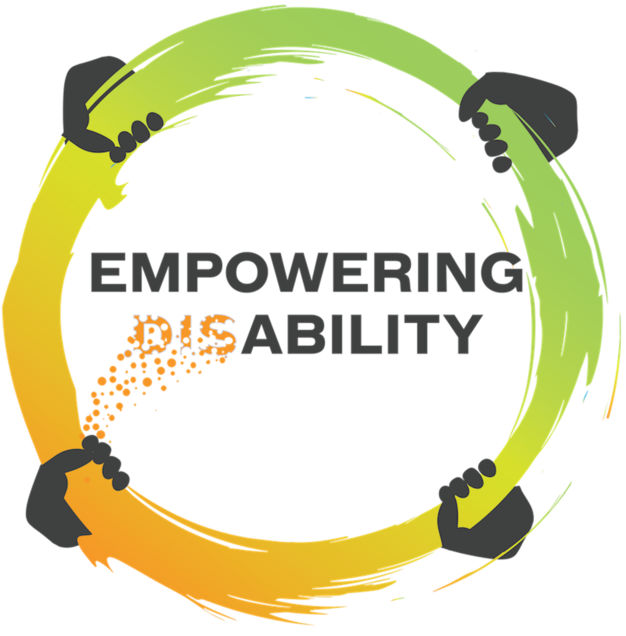 Empowering Ability Podcast
Empowering Ability Podcast
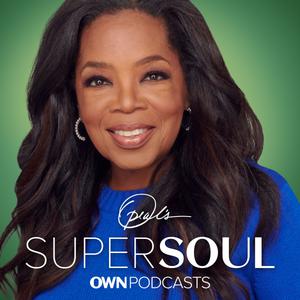 Oprah's Super Soul
Oprah's Super Soul
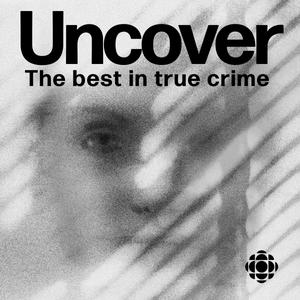 Uncover
Uncover
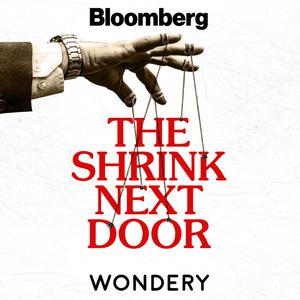 The Shrink Next Door
The Shrink Next Door
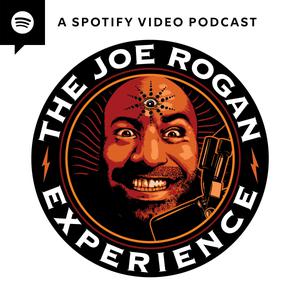 The Joe Rogan Experience
The Joe Rogan Experience